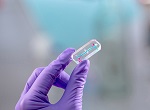Science and Engineering
 Cellular scaffolding secrets unlocked: scientists discover key to microtubule growth
Cellular scaffolding secrets unlocked: scientists discover key to microtubule growth30 May 2025
Scientists found out how naturally unstable filaments decide whether to grow or to shorten.
 Electrophysiology at atomic resolution: scientists simulate ion channel currents with unprecedented
Electrophysiology at atomic resolution: scientists simulate ion channel currents with unprecedented21 May 2025
Breakthrough study reveals how potassium ions flow through channels in cells – with implications for drug development and understanding neural signalling
 Light-to-electricity nanodevice reveals how Earth’s oldest surviving cyanobacteria worked
Light-to-electricity nanodevice reveals how Earth’s oldest surviving cyanobacteria worked16 May 2025
Atomic-level snapshot of a 3-billion-year-old photosynthetic assembly shows life nailed the design early.
 New insights into black hole scattering and gravitational waves unveiled
New insights into black hole scattering and gravitational waves unveiled15 May 2025
A landmark study published in Nature has established a new benchmark in modelling the universe’s most extreme events: the collisions of black holes and neutron stars.
 Queen Mary scientists achieve micro-scale breakthrough with big promise
Queen Mary scientists achieve micro-scale breakthrough with big promise13 May 2025
New techniques to mimic the complexity of living human organs provide an alternative to using animals in science
 Queen Mary University of London to play key role in new UK Multidisciplinary Centre for Neuromorphic Computing
Queen Mary University of London to play key role in new UK Multidisciplinary Centre for Neuromorphic Computing8 May 2025
A new national initiative to pioneer brain-inspired, energy-efficient computing technologies has been launched, with Queen Mary University of London playing a crucial role alongside other leading UK institutions.
--by-Pinglabel-small.jpg) Atom-thin semiconductors could cut energy use by over 90%
Atom-thin semiconductors could cut energy use by over 90% 29 April 2025
A team of UK scientists at Queen Mary University of London, University of Nottingham and University of Glasgow has received a £6 million EPSRC programme grant, “Enabling Net Zero and the AI Revolution with Ultra-Low Energy 2D Materials and Devices (NEED2D).” This will develop energy efficient, atomically-thin semiconductors to dramatically reduce the electricity demand from AI data centres and high-performance computing.
 A vast molecular cloud, long invisible, is discovered near the solar system
A vast molecular cloud, long invisible, is discovered near the solar system28 April 2025
An international team uncovers a hidden celestial structure using innovative far-ultraviolet techniques.
 New study reveals critical gaps in insect biodiversity research
New study reveals critical gaps in insect biodiversity research4 April 2025
Researchers propose a unified framework to monitor and protect insect biodiversity amid growing concerns over global declines
 Biologists discover ancient neurohormone that controls appetite
Biologists discover ancient neurohormone that controls appetite25 March 2025
A team of biologists at Queen Mary University of London has discovered that a neurohormone controlling appetite in humans has an ancient evolutionary origin, dating back over half a billion years.
 Climate change fuelling mental health crisis in areas most affected by climate crisis
Climate change fuelling mental health crisis in areas most affected by climate crisis UK-led breakthrough offers path to stable, low-cost solar hydrogen production
UK-led breakthrough offers path to stable, low-cost solar hydrogen production What do pesticides do to bumble bee brains over time?
What do pesticides do to bumble bee brains over time? The quest for room-temperature superconductors
The quest for room-temperature superconductors The art of well-being: group activities shown to ease depression and anxiety in older adults
The art of well-being: group activities shown to ease depression and anxiety in older adults Gravity from entropy: A radical new approach to unifying quantum mechanics and general relativity
Gravity from entropy: A radical new approach to unifying quantum mechanics and general relativity Queen Mary University of London opens one of Europe’s largest organ-on-a-chip facilities
Queen Mary University of London opens one of Europe’s largest organ-on-a-chip facilities  Groundbreaking study reveals how topology drives complexity in brain, climate, and AI
Groundbreaking study reveals how topology drives complexity in brain, climate, and AI A Night of Science and Engineering: exploring Tomorrow’s World at Queen Mary
A Night of Science and Engineering: exploring Tomorrow’s World at Queen Mary  Queen Mary PhD student contributed to the new generative AI model in gameplay creativity
Queen Mary PhD student contributed to the new generative AI model in gameplay creativity Queen Mary welcomes new Royal Society URF awardee to lead exoplanet research project
Queen Mary welcomes new Royal Society URF awardee to lead exoplanet research project Pesticide impacts on bees more complex than expected
Pesticide impacts on bees more complex than expected Queen Mary academic contributes to groundbreaking study on Nord Stream methane emissions
Queen Mary academic contributes to groundbreaking study on Nord Stream methane emissions
 Breakthrough study reveals the secrets behind cordierite’s anomalous thermal expansion
Breakthrough study reveals the secrets behind cordierite’s anomalous thermal expansion New fossil discovery sheds light on the early evolution of animal nervous systems
New fossil discovery sheds light on the early evolution of animal nervous systems